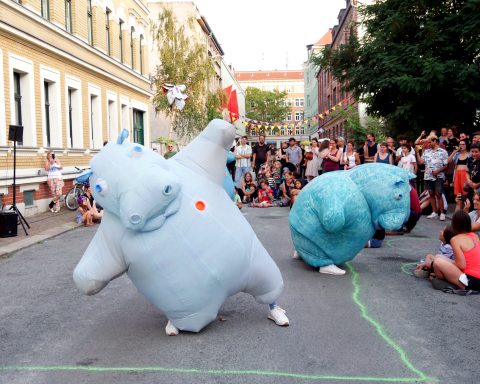Two interesting things happened to me yesterday, both related to the topic of crowdfunding – or financing one’s project via money contributed by various people in various amounts towards an established final goal within a time limit, most often through an online platform that earns commission from it.
First, I posted here a Q&A with Dave Murphy (head of http://lostinleipzig.com), in the midst of which he talked about Leipzig’s internationalization boom and gave me a tip that I decided to save for later (now): “Check out these guys,” he wrote, and included a link. I visited the page (http://www.podstellife.com) and was delighted to find out just what “these guys” were up to. It turns out that a group of people traveled the world looking for a place to set up what they refer to as “the world’s first crowdsourced hostel,” and decided to open it in Leipzig, hopefully in March 2016.
Later in the day, a friend of mine invited me to a crowdfunding workshop that would be taking place the same evening on the HHL campus in Leipzig, and I spontaneously decided to go. I ended up learning more than I thought I would, although the workshop, organized in conjunction with Universität Leipzig‘s Smile program, was entirely in German (putting myself out there in German-speaking life is paying off).
I thought, why not combine these two things for my Tuesday travel column?
So… what are the hostel guys up to?
“Podstel is a shoestring hostel project started on the road in Outback Australia and carried 50,000 km in a backpack across 4 continents and 35 countries,” they write on their site, adding that the 6-person team has spent the past three years “visiting and learning from over 300 hostels/hotels. In that time, we have developed the Podstel concept from tents, car parks, couches, cafes, beaches, and of course, the side of the road.” They’ve all now moved to Leipzig, where they’re learning German, gathering community support, and finalizing their property search and preparatory stages for their crowdfunding campaign, scheduled to begin by October 2015 and aiming to raise €100,000. They want the hostel to be a cultural center besides a hub for travelers, and are recruiting local people to help out. Here’s why they say they chose Leipzig, after first considering Berlin:
“…on our way hitchhiking towards Berlin we stumbled upon the beautiful and vibrant city of Leipzig – which we all fell in love with straight away. [Besides the proximity to major European cities, easy rail access and cheap flights from Leipzig airport,] the city is bike friendly, full of parks and nature, as well as spectacular architecture. Leipzig has an emerging creative scene and rebellious young population. Couple in incredibly cheap prices (approximately 30% cheaper than Berlin) and an environment that permits young people, we really believe this is the right home for Podstel.”
Here’s more of a personal look into their journey:
What has their crowdfunding journey been like?
A long preparation has been ongoing for the Podstel project, from the time the idea for the crowdfunding campaign was born (three years ago or so) until the actual fund-gathering campaign starts later this year. This includes the physical exertion of traveling thousands of kilometers and actively looking for a place to settle and eventually relocating to Leipzig, but also probably an insane amount of networking. Talk about commitment! And here’s where I begin to incorporate the information I learned yesterday at the crowdfunding workshop. Our instructor made it clear in her presentation that an array of elements should be in place before the crowdfunding campaign starts. Namely,
1. A good story:
People other than your relatives and close friends probably won’t support you unless you have a convincing story, one that appeals to their emotion, or of something they’d like to see in their community and personally be a part of. Creative and artistic projects with a social component tend to fare best in the now multibillion-euro industry of crowdfunding. There’s likely a public in Leipzig for this hostel, given the alternative creative vibe and growing sense of community; and actually, hostels are lacking here. Besides that, the Podstel team is appealing to the natural backpackers’ bond, shared by many travel-lovers who have stayed at hostels before (which I’ve experienced myself).
2. Community feedback and support:
One important catch about crowdfunding is that usually, if you don’t reach your goal in terms of contributions within the allotted time, all the money goes back to the benefactors. So it’s important to get people involved in and behind your project as soon as possible, and as many as possible. (Especially if your goal is something like €100,000!) It’s also important to hear people out on the project. The Podstel guys have been very smart in traveling around to look for the ideal place for the hostel, probably gathering supporters all over – people with common interests and loyalty to the hostel concept. They have a whole list of ways people can help from now on, too.
3. Building engagement online:
Since crowdfunding tends to take place via online platforms, it’s important to establish an online presence early on, to keep people engaged, and also to easily promote the campaign. For the engagement part, our workshop instructor pointed out, it’s useful to set up a blog where you give constant updates on the status of your crowdfunding campaign and project. And don’t forget to add photos and videos to further grab your audience; the Podstel guys have even made a documentary. You can keep up with the Podstel team through their blog (http://www.podstellife.com/blog). Facebook page (https://www.facebook.com/podstel), Twitter (https://twitter.com/podstel), and YouTube channel (https://www.youtube.com/user/podstel).
4. Press packet:
Another highlighted item at yesterday’s crowdfunding workshop. Get the word out via as many outlets as possible, and be strategic about it. The Podstel site says their project has been featured on various major media channels – radio, newspapers, news and technology Web sites, etc.
5. Concrete plans:
A budget, a business plan, a communications plan, rewards to give contributors. All these may sound a little excruciating for creative souls like me and you, but they’re necessary. People need to know just what their money will be used for. And whether it’s a t-shirt or a share in the project (especially with crowdinvesting, which involves actually owning part of the project), people will likely want something in return. Unless they’re donating money to, say, victims of a natural disaster. Which is not the case with Podstel. Besides money contributions, they’re looking for people to work at the hostel (not sure if only on a volunteer basis). Let’s see what they come up with, in terms of detailed plans, for their actual crowdfunding campaign…
6. Choosing the right crowdfunding platform:
The Podstel team has chosen Indiegogo, which our instructor yesterday referred to as a major “classic crowdfunding platform,” for their upcoming campaign. But there are many others, as the instructor pointed out: VisionBakery, Startnext, Kickstarter, Ulule, GoFundMe, etc. A former colleague I featured on LeipGlo even used Facebook itself as a crowdfunding platform. And if you’re looking for shareholders for your project (crowdinvesting), there are platforms such as Seedmatch, Companisto and Innovestment; and for crowdlending, Lendico is an example.
So if you’ve got a dream you’d like financed – along with some time, creativity, a bit of a business and marketing sense, and networking and social media skills – crowdfunding may be an option for you. There are also specialized platforms, for example for travel (Trevolta, Kicktraveler). This means you could even start with seeking out money from folks to travel the world… that is, if you can make your dream, the goals and motivations surrounding it, sound special enough.







